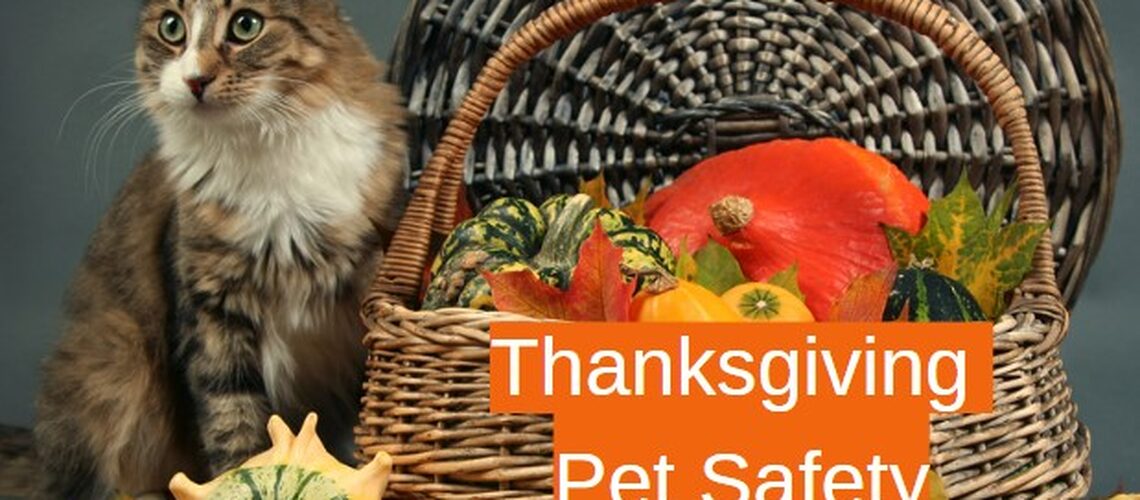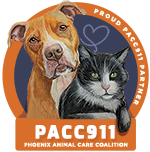Overindulging in the family feast can be unhealthy for humans, and even worse for pets. Fatty foods are hard for animals to digest. Poultry bones can damage your pet’s digestive tract. And holiday sweets can contain ingredients that are poisonous to pets.
- Keep the feast on the table—not under it. Eating turkey or turkey skin—sometimes even a small amount—can cause a life-threatening condition in pets known as pancreatitis. Fatty foods are hard for animals to digest, and many foods that are healthy for people are poisonous to pets, including onions, raisins, and grapes. If you want to share a Thanksgiving treat with your pet, make or buy a treat that is made just for them.
- No pie or other desserts for your pet. Chocolate can be harmful for pets, even though many dogs find it tempting and will sniff it out and eat it. The artificial sweetener xylitol—commonly used in gum and sugar-free baked goods—also can be deadly if swallowed by dogs or cats.
- Yeast dough can cause problems for pets, including painful gas and potentially dangerous bloating.
- Put the trash away where your pet can’t find it. A turkey carcass sitting out on the table, or left in a trash container that is open or easily opened, could be deadly to your family pet. Dispose of turkey carcasses, bones, and scraps—and anything used to wrap or tie the meat, such as strings, bags, and packaging—in a covered, tightly secured trash bag placed in a closed trash container outdoors (or behind a closed, locked door).
- Be careful with decorative plants. Some flowers and festive plants can be toxic to pets. These include amaryllis, baby’s breath, sweet William, some ferns, hydrangeas, and more. The ASPCA has lists of plants that are toxic to dogs and cats, but the safest route is simply to keep your pet away from all plants and table decorations.
- Quick action can save lives. If you believe your pet has been poisoned or has eaten something they shouldn’t have, immediately call your veterinarian or local veterinary emergency clinic. You also can call the ASPCA Poison Control Center (888-426-4435) or the Pet Poison Helpline (855-764-7661); note that a fee may apply. Signs that something might be wrong with your pet include sudden behavior changes, depression, discomfort or pain, vomiting, and/or diarrhea. Contact your veterinarian immediately if your pet shows any of these signs.
Precautions for Parties
If you’re hosting a party or overnight visitors, plan ahead to keep your pets safe and make the experience less stressful for everyone.
- Visitors can upset your pet. Some pets are shy or excitable around new people or in crowds, and Thanksgiving often means many visitors at once and higher-than-usual noise and activity levels. If you know your dog or cat is nervous when people visit your home, put them in another room or a crate with a favorite toy. This will reduce the emotional stress on your pet and protect your guests from possible injury. If your pet is particularly upset by houseguests, talk to your veterinarian about possible solutions to this common problem. Any dog can bite. Learn about dog bite prevention.
- Watch the exits. Even if your pet is comfortable around guests, make sure you watch them closely, especially when people are entering or leaving your home. While you’re welcoming hungry guests and collecting coats, your pet may make a break for it and become lost outdoors.
- Identification tags and microchips reunite families. Make sure your pet has proper identification with your current contact information—particularly a microchip with up-to-date, registered information. That way, if they do sneak out, they’re far more likely to be returned to you. If your pet isn’t already microchipped, talk to your veterinarian about the benefits of this simple procedure.
- Watch your pets around festive decorations. Special holiday displays or candles are attractive to pets as well as people. Never leave a pet alone in an area with a lit candle; it could result in a fire. Other decorations like ornamental corn cobs and plastic or fabric leaves can cause choking or intestinal blockage if eaten.



